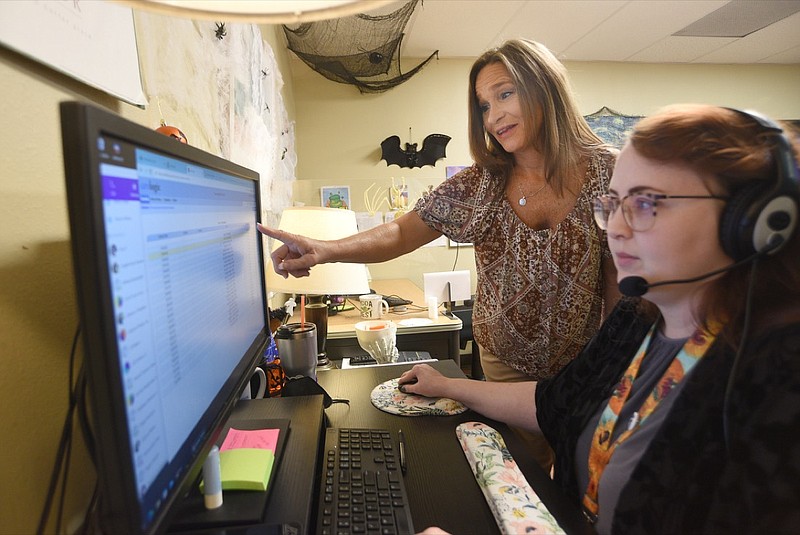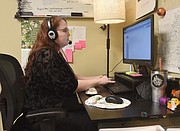About three weeks ago, social worker Angie Duncan took a call from a woman alone in her car on a country dirt road.
The woman was depressed, had a loaded gun in her lap and was considering taking her own life. But Duncan, the crisis call center coordinator for Volunteer Behavioral Health, said that's when the woman saw an ad for 988 on her phone and decided to call.
When there's an emergency, people universally know to call 911. But instead of police officers, firefighters or EMS workers, many people experiencing a mental health emergency are better helped by professionals such as Duncan who are specially trained to handle the situation.
That's the idea behind the new, three-digit 988 number -- which went live July 16 to serve as a universal entry point for anyone in the United States to reach a trained crisis counselor, 24/7. The hope is that the number will do for mental health crises what 911 has done for emergency services by getting people the care they need in a timely fashion, ultimately saving lives.
Just like 911, 988 calls are routed to a call center. Call center workers triage calls and determine what level of care is needed for a range of issues, including thoughts of suicide, mental health or substance use crisis and other types of emotional distress.
In addition to calling, people can text 988 or chat online through 988lifeline.org. All 988 services are also open to friends and family members who need crisis support or help finding resources for a loved one.
Becky Stoll, senior vice president of crisis services at Centerstone -- a nonprofit health system providing mental health and substance use disorder treatment, including operating a 988 call center in Tennessee -- said people in mental health crises often wind up in emergency departments because the mental health system in the U.S. is historically fragmented and difficult to navigate, so people don't know where else to go.
"It's like killing a fly with a sledgehammer when you really didn't need a sledgehammer," Stoll said in a phone interview. "I think the more we can stop utilizing law enforcement, utilizing emergency services and the emergency departments and really pair people with appropriate care -- just like we do with physical health -- I hope we see the system right itself."
In Duncan's case, she was able to determine the woman's location, convince her to put the gun away and drive back to a main road. She then dispatched help while the woman waited at a local store and Duncan continued to counsel her.
Local law enforcement met the woman, assured her safety, and the woman was connected to mental health services rather than being sent to jail or worse, Duncan said in a phone interview.
Not all calls fielded through 988 are as potentially dire. Sometimes call takers help connect callers to local support services. Other calls might come from a hospital or another community provider that needs a referral to an inpatient facility for a patient with severe depression or a substance use disorder. It could also be a friend or family member on the line looking for help on behalf of their loved one.
"We get a lot of those kinds of calls," Duncan said. "They want to start a process, and they want or need to know what they can do."
Suicide prevention and crisis hotlines are nothing new. In Tennessee, many community behavioral health providers have long operated their own 1-800 number and dispatched mobile crisis teams when called upon. The difference now is 988 aims to centralize those calls under one, easy-to-remember number, and increased federal funding is available to bolster call center infrastructure.
Since October 2019, the Tennessee Department of Mental Health and Substance Abuse Services has used grants to expand its crisis call center capacity.
More than 162,000 calls to different crisis and suicide prevention lines were fielded across Tennessee between July 1, 2021, and June 30, 2022, according to a department spokesperson.
A $1.69 million grant from the federal government that started April 30, ahead of the 988 launch in July, allowed Tennessee to add 37 full-time equivalent staff to call centers across the state with the goal of maintaining a 90% in-state answer rate, according to the spokesperson.
Nationally, more than 361,000 calls, chats and texts have been routed through 988 so far, according to data from the U.S. Substance Abuse and Mental Health Services Administration.
In Tennessee, nearly 6,000 calls came through 988 in July and August, with the largest volume occurring from July 18-24, which saw 1,183 calls.
Marie Williams, commissioner of the Tennessee Department of Mental Health and Substance Abuse Services, said via phone that data for July and August are likely "artificially inflated," because there was an initial spike in callers who just wanted to test if the new number worked and see what happened when they called.
"We're thinking that when we look at September, October numbers, that's going to be more indicative of what the real rate of calls is going to be," Williams said.
Volunteer Behavioral Health contracts with the state to cover 988 services for 29 counties, including those in the Chattanooga region. In addition to 988 calls, the provider fields calls through its own crisis hotline and deploys mobile crisis workers when needed.
(READ MORE: Chattanooga police launch new mental health co-response unit)
In the time since 988 went into operation, Volunteer Behavioral Health has received the most calls in its call center history, Duncan said. For example, in August 2021, the call center answered 475 calls compared to 736 calls in August 2022.
"We've managed to be able to answer all the calls," Duncan said. "But it's just so, so much work for my staff, and the calls are getting more and more, so it is helping a lot that I'm able to hire more people."
Stoll said Centerstone has seen a 30% increase in call volume in the first month and a 63% increase in answer rates since 988's launch.
"We've got people and more bodies, and we can do more," she said.
While Tennessee did "a phenomenal job" preparing its call center providers for 988's launch, Stoll said advertising for the service has been minimal in an effort to not overwhelm the system. She believes the volume of calls, chats and texts will only increase as awareness about 988 grows.
Stoll said providers are also starting to see more of an effect from COVID-19 on people's mental health, which has increased the demand for services.
"You're seeing people who never had mental health issues or accessed services in their life finding themselves in a place where they need to do that," she said. "We're seeing lots of depression and anxiety and substance use in people as a result of the pandemic. We are definitely seeing lots and lots and lots of negative consequences for young people -- children and youth -- and they do tend to text and chat."
Williams said time will tell how popular 988 becomes in Tennessee. Because Tennessee already had a robust crisis response infrastructure, the effect of the new number may be less than in states that have only recently begun ramping up call centers, mobile teams, crisis stabilization units and building relationships with first responders.
"For us, we need to follow the data," she said.
In the meantime, Williams said she wants all Tennesseans to know there is free help always available for their mental health needs.
"If you are struggling and you're having a crisis and you need help, call 988, especially if you're struggling with addiction or a mental health concern," Williams said. "There are people across the state that can help and want to help."
Contact Elizabeth Fite at efite@timesfreepress.com or 423-757-6673. Follow her on Twitter @ecfite.

